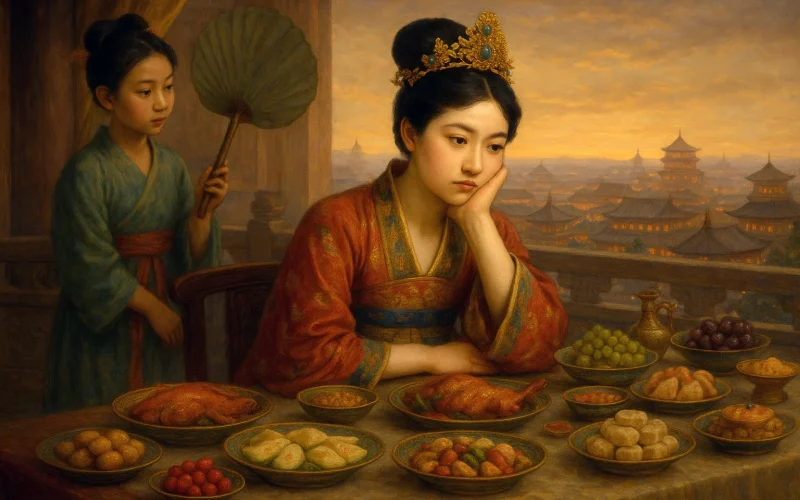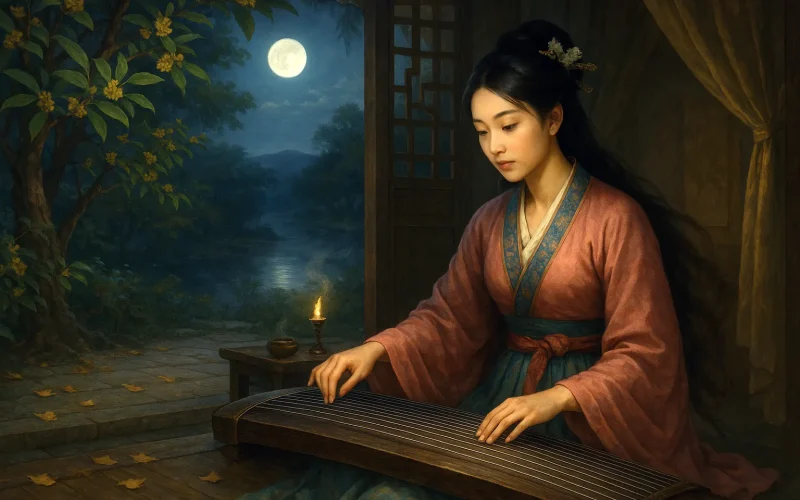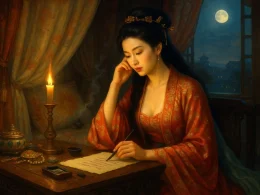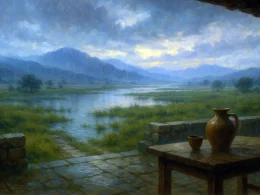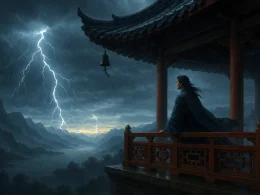I have sailed the River of Yellow Flowers,
Borne by the channel of a green stream,
Rounding ten thousand turns through the mountains
On a journey of less than thirty miles….
Rapids hum over heaped rocks;
But where light grows dim in the thick pines,
The surface of an inlet sways with nut-horns
And weeds are lush along the banks.
…Down in my heart I have always been as pure
As this limpid water is….
Oh, to remain on a broad flat rock
And to cast a fishing-line forever!
Original Poem
「青溪」
王维
言入黄花川, 每逐青溪水。
随山将万转, 趣途无百里。
声喧乱石中, 色静深松里。
漾漾泛菱荇, 澄澄映葭苇。
我心素已闲, 清川澹如此。
请留盘石上, 垂钓将已矣。
Interpretation
This landscape poem was composed by Tang Dynasty poet Wang Wei during his early reclusive years in the Lantian Southern Mountains. Choosing to withdraw from worldly clamor, the depicted "Blue Stream" becomes an idealized sanctuary for spiritual repose and self-renewal. The verses reveal his profound love for nature while expressing yearning for hermitic life, embodying his vision of serene existence.
First Couplet: "言入黄花川,每逐青溪水。"
Yán rù huánghuā chuān, měi zhú qīng xī shuǐ.
Speaking of entering Huanghua Valley,/ I often follow the Blue Stream's flow.
These opening lines establish the poet's habitual communion with this landscape through economical phrasing. The stream emerges as both physical destination and spiritual anchor.
Second Couplet: "随山将万转,趣途无百里。"
Suí shān jiāng wàn zhuǎn, qù tú wú bǎi lǐ.
Following mountains through countless turns,/ The fascinating path spans under hundred li.
The meandering stream's topography mirrors life's circuitous journey, where "countless turns" suggest experiential richness compressed within modest physical scale.
Third Couplet: "声喧乱石中,色静深松里。"
Shēng xuān luàn shí zhōng, sè jìng shēn sōng lǐ.
Sound clamors among chaotic stones;/ Hue quiets in deep pine shadows.
A masterful juxtaposition: aural dynamism versus visual tranquility, demonstrating nature's capacity to hold contradictory harmonies within unified scenery.
Fourth Couplet: "漾漾泛菱荇,澄澄映葭苇。"
Yàng yàng fàn líng xìng, chéng chéng yìng jiā wěi.
Rippling with floating water chestnuts;/ Crystal-clear reflecting reed catkins.
The doubling adjectives ("漾漾","澄澄") create rhythmic undulation, while aquatic plants' delicate movements epitomize nature's effortless artistry.
Fifth Couplet: "我心素已闲,清川澹如此。"
Wǒ xīn sù yǐ xián, qīng chuān dàn rú cǐ.
My mind long untroubled and calm -/ This clear stream mirrors my peace.
The philosophical pivot where external landscape and internal state achieve perfect consonance, the stream becoming a liquid mirror of the soul.
Sixth Couplet: "请留盘石上,垂钓将已矣。"
Qǐng liú pán shí shàng, chuí diào jiāng yǐ yǐ.
Let me linger on this flat stone,/ Fishing pole resting, time dissolving.
The closing allusion to Eastern Han hermit Yan Ziling transforms fishing into spiritual practice - an act of resistance against bureaucratic life through contemplative stillness.
Holistic Appreciation
Wang Wei constructs a multidimensional sanctuary where stream morphology (couplets 1-2), sensory phenomena (3-4), and mind-landscape fusion (5-6) progressively deepen the poem's meditative dimensions. The Blue Stream evolves from geographical feature to psychological counterpart, ultimately becoming a medium for transcendent experience.
Artistic Merits
The poet captures nature's diverse manifestations through fresh and natural brushstrokes. Wang Wei imbues every segment of the Blue Stream with vitality via alternating depictions of movement and stillness. While painting the scenery, he seamlessly blends natural landscapes with personal sentiment, making the poem both aesthetically pleasing and philosophically profound. Wang Wei's landscape poetry consistently employs concise yet profound language to create an ethereal, serene atmosphere. Though devoid of ornate rhetoric, the poem achieves organic fusion of scenery and emotion through fluid naturalism and delicate touches, ultimately conveying a detached and tranquil outlook on life.
Insights
The poem models how natural observation can cultivate equanimity amidst societal turbulence. Wang Wei's stream becomes both refuge and teacher, demonstrating that true reclusion isn't geographical withdrawal but perceptual reorientation - finding cosmic depth in a waterweed's sway. For modern readers, it suggests mindfulness as radical resistance: by fully inhabiting each ripple and stone, we reclaim autonomy from fragmenting modernity.
Poem translator
Kiang Kanghu
About the poet

Wang Wei (王维), 701 - 761 A.D., was a native of Yuncheng, Shanxi Province. Wang Wei was a poet of landscape and idylls. His poems of landscape and idylls, with far-reaching images and mysterious meanings, were widely loved by readers in later generations, but Wang Wei never really became a man of landscape and idylls.







